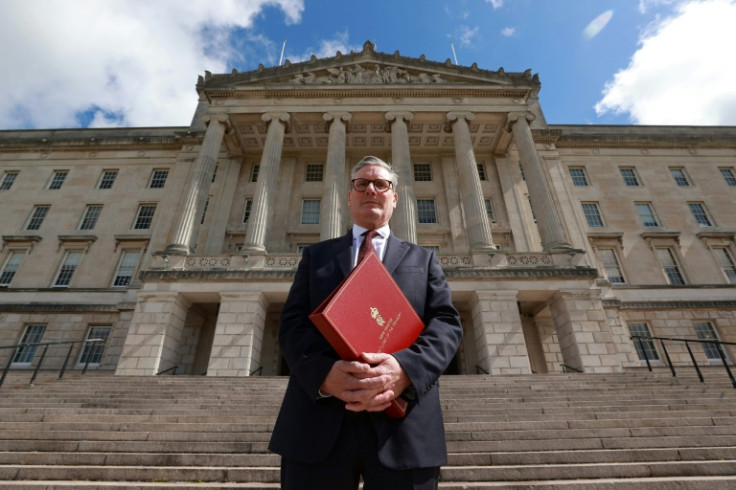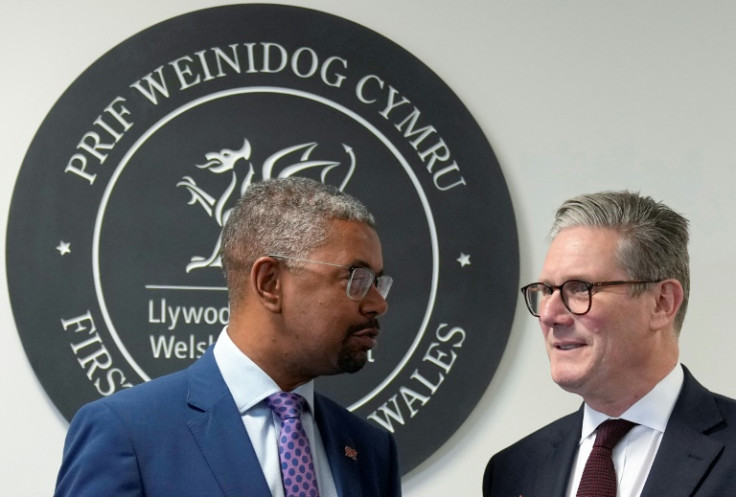
New Prime Minister Keir Starmer on Monday wrapped up a whistlestop tour of the UK, promising Northern Ireland's leaders "a different way of doing politics" following years of Brexit turmoil.
Starmer, whose centre-left Labour party won last week's general election, ended the two-day tour in Cardiff, meeting party allies heading Wales' devolved government, after also visiting Scotland and Northern Ireland.
In Belfast, he met the leaders of the UK province's power-sharing executive and other parties at the Stormont parliament buildings.
"I've been very clear that my government has a mandate for change, for stability here in Northern Ireland and a different way of doing politics," Starmer said after the talks.
He had met First Minister Michelle O'Neill, of the pro-Irish unity Sinn Fein, as well as the party's president Mary Lou McDonald, alongside deputy First Minister Emma Little-Pengelly, of the pro-British Democratic Unionist Party (DUP).
Northern Ireland's parties appeared united in hoping Starmer can improve stability and engagement, as well as relations with Dublin, after strained ties under his Conservative predecessors.
McDonald told reporters the talks were "very constructive" and expressed "happiness" that "the party of the Good Friday Agreement, the Labour Party, is now back in government in London".
The Sinn Fein leader said she reminded Starmer that "referendums, provision for referendums and charting our future together" are at the "very core" of the landmark peace accord, brokered by Tony Blair's Labour government in 1998.
"We want this British government to be at the heart of honouring that agreement, fulfilling that agreement, in all of its parts," she added.
Sinn Fein held on to its seven seats at last Thursday's election to become the largest Northern Ireland party in the UK parliament in London.
It overtook its main DUP rival, which lost three of its eight seats, two of them to rival unionist parties.
Analysts see the result as allowing Sinn Fein, which does not take up its seats in the House of Commons because it opposes British sovereignty in Northern Ireland, to claim continued momentum towards an eventual referendum, or "border poll", on Irish unity.
The party, the former political wing of the paramilitary IRA during the Troubles -- the three-decade sectarian conflict over British rule in Northern Ireland -- is also the largest at council level and in the devolved Northern Ireland Assembly.
But James Pow, a politics lecturer at Queen's University Belfast, told AFP "the fundamentals haven't changed", pointing to roughly equal combined vote share at the election between nationalist and unionist parties.
Starmer and his newly appointed Northern Ireland secretary, Hilary Benn, "won't feel forced to put a border poll on the agenda, at most some pressure to outline procedural criteria for a poll to take place".
Pro-UK unionists have historically allied with the UK Conservative party and been wary of Labour, but few are shedding any tears over the Tories' defeat after 14 turbulent years in power.
"He has the opportunity to make significant changes and advance things positively," DUP leader Gavin Robinson said after his party had a "productive discussion" with Starmer.
Post-Brexit trading rules agreed to by the DUP are seen by some unionists as erecting a de facto "sea border" between the British mainland and the province, undermining its place within the wider UK.
Unionists "hope that Starmer might prioritise tighter alignment with the EU, which could in turn mitigate the impact of the sea border, if not remove it", Pow said.
Meanwhile, Labour's manifesto committed to scrapping a controversial "Legacy Act" that prompted Dublin to sue London at the European Court of Human Rights.
The law, which came into effect in May, halted inquests into Troubles-era crimes, including many that allegedly involved British security forces, and granted conditional immunity to perpetrators.
"There's no wriggle room on that, Labour has to remove it," Jon Tonge, a politics professor at Liverpool University, told AFP.









